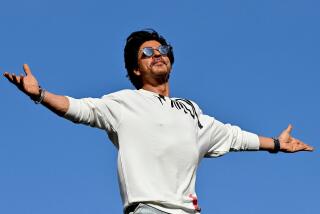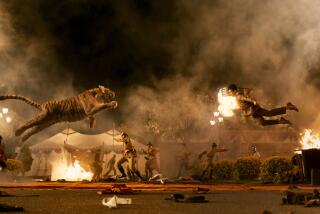Actors Steal the Scene in Tamil Politics
- Share via
MADRAS, India — It all started at one of those gatherings in the countryside where villagers turn out by the thousands to ask film star Vijaykanth -- known as the John Wayne of Tamil cinema -- to name their babies.
After selecting some names, Vijaykanth told his adoring supporters he deplored the political situation in their impoverished state of Tamil Nadu, pointedly wondering how the son of the leader of the PMK, one of the region’s big political parties, just got appointed the country’s health minister.
With that, the battle was on. PMK cadres tore down the life-size cutouts of Vijaykanth that adorn the boulevards of the capital of this movie-mad state and marched outside a college that was founded by the action hero.
Vijaykanth’s fan club -- uniform-clad loyalists who have sworn an oath of obedience to the actor and breathlessly await his much-postponed decision on his political future -- responded in kind. They brawled in the streets with the PMK and burned effigies of the party chief and his son.
Such is politics as usual in Tamil Nadu, where cinema, populism, hero-worship and the Tamil flair for the dramatic have blended in a way that would make Arnold Schwarzenegger blush.
“They’re both the same,” Sharath Kumar, a Tamil actor and member of Parliament, said of the political and cinema worlds. “In politics you’re working hard for the people. And here, in entertainment, you’re working hard for the people so they can laugh, relax, forget about their worries.”
The state’s chief executive, Jayalalitha, is a former leading lady, and a local artist recently painted a portrait of her in his own blood. Her co-star, political mentor and predecessor as chief minister, M.G. Ramachandran, known as MGR, held office for 10 years until his death in 1989. A statue of him stands in downtown Madras.
The state’s most influential political party was founded by a screenwriter. When actors run for office, their fan club cadres join political ground operations, going door to door and packing polling places.
It all makes for an entertaining political world and a relentlessly populist government in this state, home to the minority Tamil community that has long chafed against the Hindi-speaking political and film capitals of New Delhi and Bombay, or “Bollywood.”
Tamil films are rife with stories of humble villagers or working men rising up against entrenched political orders and corrupt institutions -- the perfect backdrop for the “power to the people” message carried by nearly every Tamil politician.
In a bid to win popularity, action heroes become social activists, competing to see who can help the downtrodden more. As a result, some of Tamil Nadu’s anti-poverty efforts, such as a school lunch program founded by MGR, have become models for poor nations worldwide.
That’s not to say actors necessarily make better politicians, said Sadanand Menon, a writer and political analyst based in Madras, which has been officially renamed Chennai. “They have a more hysterical contact with their base,” he said, “but otherwise they’re as clueless as the next politician.”
Jayalalitha has become a divisive figure, notorious for assaulting an auditor in her office and convicted in corruption cases, for illegally approving a hotel project and dubious land purchases during her previous term in the early ‘90s. Despite her convictions, which were stayed pending appeal, her coalition swept to an overwhelming victory at the polls in 2001.
Many also find something unsavory about the way actors, with the help of party members in the industry, position themselves as heroes in film after film, then leap into elected office.
“Some of us call it a fascist tool,” Menon said.
PMK boss S. Ramadoss is one of those people. His party is one of the few that does not field actor-candidates for elected office, and he has no problem taking them on in public. “They want to get cheap popularity. They make all these youngsters fools through these fan clubs,” Ramadoss said of stars-turned-pols.
Ramadoss, a lean, sharp-spoken man whose aides stand at attention when he enters a room, is no stranger to feuds with film stars. This year, the party clashed with another Tamil film icon, Rajnikanth. He and Ramadoss traded insults, PMK cadres attacked theaters where Rajnikanth’s new film was showing, and the actor endorsed a slate of legislative candidates against the PMK. The slate lost.
“These actors,” he said, “they have ruined Tamil Nadu politics for 23 years.”
The intermingling of cinema and politics is not new on this sweltering, scrubby tip of the subcontinent. After India became an independent nation in 1947, Tamil Nadu was carved out as a state for the Tamil-speaking population. Many of the fiercely independent Tamils weren’t satisfied -- especially C.N. Annadurai, a writer who founded the Dravidian Progressive Movement, known as the DMK.
Annadurai first used plays to spread his Marxist-tinged, Tamil nationalist message, but he soon turned to the emerging medium of cinema. One of his party lieutenants -- the actor and future chief minister MGR -- became the messenger.
At the time, movies were largely historical fantasies, but Annadurai wrote screenplays set in the present, helping Tamil movies earn a reputation for greater realism than Hindi cinema. MGR appeared in more than 50 such movies, always filmed wearing the black and yellow Tamil colors. He paused from beating up crooked cops and pols to tell the camera about the glories the DMK would bring.
In his spare time, his fan club distributed raincoats to rickshaw drivers and toothpaste to poor villagers. It was only a matter of time until he became chief minister.
MGR’s legacy has loomed over the intersection of Tamil politics and pop culture ever since. T.K.S. Elangovan, the DMK’s current organizing secretary, said that not every action hero can enjoy the success of an MGR.
“I’ll go to a movie as an entertainment,” Elangovan said, “but I’ll not accept the hero as a leader unless, in his personal life, he attracts me.”
Sharath Kumar, the actor-politician, played a villain in 36 films before he got to be a hero.
As he racked up more and more roles, Kumar, like most Tamil actors, carefully watched his image, eschewing alcohol and cigarettes on-screen, always playing a family man. In 1996, he gave a speech critical of then-chief minister Jayalalitha. “I did it not as an actor, but as a human being,” Kumar said.
The next step was, perhaps, inevitable. In 1998, Kumar joined the DMK. He narrowly lost an election for the lower house of Parliament before being appointed to the upper house three years ago.
Now Kumar, 41, commutes between New Delhi and Madras, where he continues to make films. He sees nothing wrong with mixing the professions. “Actors are also human beings,” he said. “We’re also educated. We went to college, we know problems.”
It’s natural for the electorate to turn to them, he added. “All along, they’ve been looking for a savior ... a known face.”
But times have changed since Kumar’s hero, MGR, moved voting blocs through the silver screen. “The moviegoing crowd has changed,” Kumar said in his modest trailer on a debris-laden Madras back lot where he is making a film about a soldier who returns to a village to fight corruption. “They’re not looking for sermons. They’re looking for pure entertainment.”
Kumar excused himself, donned a black overcoat and sunglasses, and went out to shoot a musical number with a woman in a slinky yellow gown and several men in Spider-Man costumes.
If Kumar represents the new vanguard of Tamil cinema, torn between cosmopolitan pursuits and Tamil loyalty, Vijaykanth is a throwback.
The 52-year-old is a veteran of 115 Tamil films but pointedly does not appear in the more lucrative Hindi-language cinema. His fans revere him for his particularly pure Tamil speech, and refer to him as “Captain” -- a reference to one of his most popular films, “Captain Prabhakaran,” in which he plays a cop with the same name as the leader of the Tamil Tigers, a militant Sri Lankan separatist group. (His fans insist that it’s just a coincidence.) On the sign-up sheet for his fan club is the slogan, “Be proud to be a Tamil!”
In many of his movies, Vijaykanth plays a common villager (or cop, or soldier) who has to battle the political status quo. Ramu Vasnathan, a childhood friend of the actor’s who founded his fan club decades ago, says this is no act.
“Even in real life,” Vasnathan said, “he’s acting against political leaders.”
For years pundits have wondered when Vijaykanth would enter the arena. The actor, who has said he would launch a political party, had also said he would announce whether he planned to run for office by late August. But he has been silent, perhaps stung after distributors, allegedly fearing the PMK’s wrath, wouldn’t touch his latest film.
But his fans are ready. “We want to do whatever he tells us to do in the movies,” Krishna Murthy said, sitting in the headquarters of Vijaykanth’s fan club in a Madras clinic funded by the actor. The walls are coated with Vijaykanth movie posters.
Murthy was growing up in a crowded district of Madras 20 years ago when he and his parents saw their first Vijaykanth movie. The message of the film -- of living outside India’s caste system and looking out for the little man -- registered deeply with Murthy.
Right away, Murthy vowed to see no other hero’s films. He followed the star’s work closely and joined the fan club. He donates spare money to the poor when Vijaykanth directs it, and distributes aid bought by the star to villages throughout the state.
Seeing a Vijaykanth film is still a family affair, but now Murthy’s 15-year-old daughter and 11-year-old twin sons are also in the entourage. When the boys get older, they will enroll in the fan club, Murthy said. “They will help me help him.”
More to Read
Sign up for Essential California
The most important California stories and recommendations in your inbox every morning.
You may occasionally receive promotional content from the Los Angeles Times.












